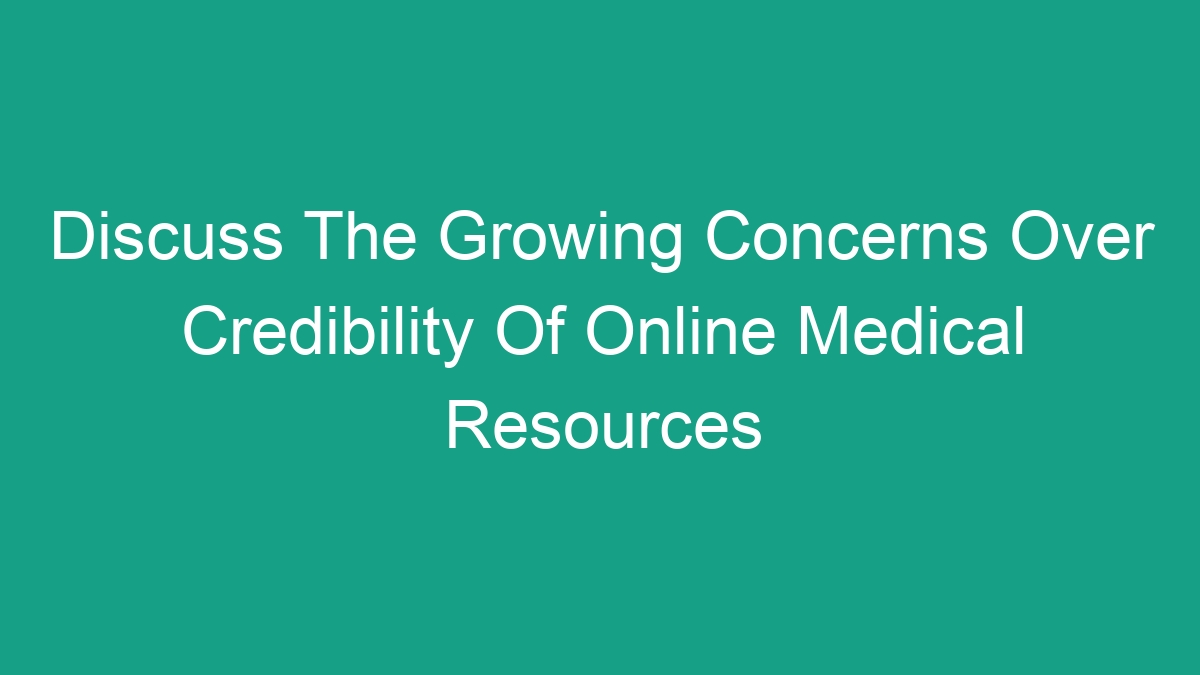
The Rise of Online Medical Information
In today’s digital age, the internet has become the go-to source of information for almost everything, including medical advice and resources. With the click of a button, individuals can access a wide array of medical information, from symptom checkers to treatment options. This ease of access has significantly transformed the way people manage their health and seek medical guidance.
However, with the proliferation of online medical resources, there is a growing concern over the credibility and reliability of the information available. As more individuals turn to the internet for medical advice, it becomes increasingly important to critically evaluate the accuracy and trustworthiness of the sources they are relying on.
The Influence of Online Medical Information
The influence of online medical information cannot be overstated. According to a survey conducted by the Pew Research Center, 72% of internet users have sought health information online within the past year. This reliance on online resources has the potential to both empower and endanger individuals’ health decisions.
Empowerment: Access to medical information online empowers individuals to take charge of their health and be more informed about their conditions and treatment options. It enables patients to engage in more meaningful discussions with their healthcare providers and actively participate in their care.
Endangerment: On the flip side, the abundance of online medical information also poses significant risks. Incorrect or misleading information can potentially lead to self-diagnosis, inappropriate treatment choices, and delayed medical care, ultimately jeopardizing an individual’s health and well-being.
The Challenge of Credibility
The credibility of online medical resources has become a major point of concern within the healthcare community. Unlike traditional medical sources, such as peer-reviewed journals and reputable healthcare organizations, the internet harbors a multitude of websites and platforms that vary widely in terms of accuracy and trustworthiness.
Quality Control: One of the primary challenges is the lack of quality control over online medical content. Anyone can publish information on the internet, regardless of their expertise or qualifications. This opens the door to misinformation, biased viewpoints, and even fraudulent claims.
Conflicting Information: Another issue that plagues online medical resources is the abundance of conflicting information. A single medical condition or treatment may be portrayed in vastly different ways across various websites, leading to confusion and uncertainty among individuals seeking reliable guidance.
Commercial Interests: The presence of commercial interests further complicates the credibility of online medical resources. Pharmaceutical companies, healthcare providers, and other entities may use the internet as a platform to promote their products or services, potentially compromising the objectivity of the information presented.
Evaluating Online Medical Resources
Given the inherent challenges in assessing the credibility of online medical resources, it is crucial for individuals to approach such information with a critical mindset. Several key considerations can help in evaluating the reliability of online medical content:
Source: Determine the source of the information. Look for content that is authored or reviewed by reputable healthcare professionals, academic institutions, or established medical organizations.
Transparency: Assess the transparency of the website or platform. Reliable sources should clearly disclose their affiliations, funding sources, and the date of the information’s last update.
Accuracy: Verify the accuracy of the information by cross-referencing it with known, credible sources. Pay attention to claims that seem too good to be true or contradict well-established medical knowledge.
Peer Review: Seek out information that has been peer-reviewed or endorsed by medical experts. Peer-reviewed articles and research papers are generally more reliable than anecdotal accounts or personal blogs.
Addressing the Issue
In light of the growing concerns over the credibility of online medical resources, it is imperative for various stakeholders to take proactive measures to address this issue:
Education: Healthcare providers should educate their patients about the potential pitfalls of relying solely on online medical information. Emphasize the importance of consulting with a qualified professional before making any health-related decisions.
Regulation: Health authorities and regulatory bodies need to establish guidelines and standards for the publication of medical information on the internet. This would help ensure that online medical content meets certain quality criteria and is free from misleading or harmful material.
Technology: The development of advanced technology, such as artificial intelligence and machine learning, holds promise in the realm of verifying the credibility of online medical resources. AI algorithms can be utilized to sift through vast amounts of information and identify reliable sources.
Collaboration: Collaboration between healthcare professionals, technology experts, and regulatory bodies is essential to create a robust framework for monitoring and maintaining the credibility of online medical resources. This collaborative effort can help establish best practices and guidelines for online health information dissemination.
Conclusion
The internet has undoubtedly revolutionized the way individuals access and consume medical information. While it offers unprecedented convenience and opportunities for empowerment, the credibility of online medical resources remains a significant concern. As the reliance on digital platforms for health-related information continues to grow, it is essential for both individuals and healthcare stakeholders to be vigilant in evaluating and promoting trustworthy sources of information. By addressing the challenges of credibility in online medical resources, we can cultivate a safer and more reliable digital landscape for healthcare knowledge and decision-making.



